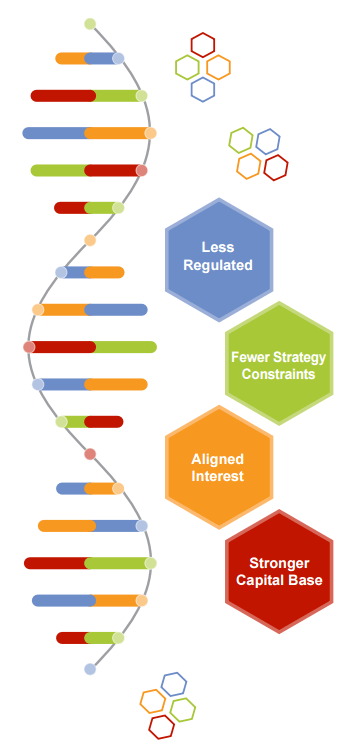Why should investors bother with hedge funds? The original proposition behind them was their promise of differentiated performance: better risk-adjusted returns with a lower correlation to traditional capital markets. However, recent history suggests that the current generation of hedge funds lacks the edge of its predecessors.
Do hedge funds still have an inherent advantage in their quest for better risk-adjusted returns, or did they lose their edge with today’s more efficient markets? In my paper, “The Hedge Fund Edge: Still Sharp or Too Dull?” I look at the key distinguishing traits in the “DNA” of hedge funds—and why they still offer an advantage for investors looking to adapt quickly with changing markets.
Hedge fund DNA has four differentiating elements that endow these investment vehicles with a competitive advantage over other investment options. The four key traits are:
- Fewer regulatory limitations
- Less constraint on strategies
- Better alignment of interests
- Stronger capital base
Alone, each of these qualities is appealing, but together the properties of each interlock with the others to provide a compelling solution for investors—if managed well and priced appropriately.

But the combination of these four attributes can be dangerous. Think about it. Giving the average adult—let alone a teenager!—the right to do whatever he or she wants with a pool of money is a strategy of hope, likely to lead to disappointment. In fact, the average hedge fund manager has not met expectations over the last decade. After adjusting for embedded market risks, net-of-fee returns have often been less than zero, particularly in recent years.
Even in the hands of an above-average manager, the attributes that enable hedge funds to excel are not for all investors. Those that prefer more transparency, more liquidity, lower-cost solutions, or more regulatory protection are a poor fit for hedge funds.
Furthermore, the qualities that give hedge funds an edge for generating better performance are not appropriate for simpler strategies that are highly commoditized or otherwise easily implemented. An investor should not consider a hedge fund to implement an index-like strategy.
Notwithstanding the challenges of manager selection and implementation risks, the inherent competitive advantages of hedge funds are still worth considering, especially for investors looking beyond traditional solutions.
